My heart fell into a deep pit in my stomach. I couldn’t escape the painful feeling of a punch into the gut. But the truth is this wasn’t about me. It was about my son.
He came home from playing at the park with his friends…bawling.
The tears were coming so fast, I could barely understand what he was saying.
He fumbled through the words. “They…they…they said I couldn’t…I couldn’t play with them anymore.”
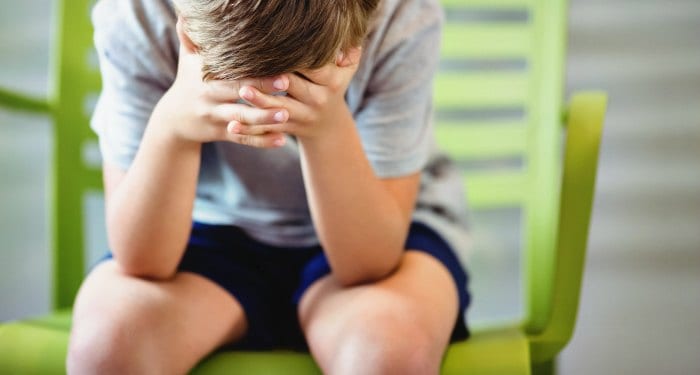
Flashes of my own childhood came up.
The pain of rejection from my elementary years crept into my mind. I thought about all the times I was tormented for having red hair and freckles. The times I was told I was not accepted as part of the group. And how I felt completely powerless and alone in those moments.
It hurts. Growing up hurts.
And when our kids hurt. We hurt.
Here’s the hardest part.
Kids don’t need you to make them feel better. They need you to listen and sit beside them in the tough moments. I desperately wanted to fix this for him and erase his pain. My own childhood self was commanding me to do so.
Instead, I held back because my job as a parent isn’t to calm him down, fix his emotions or stop them altogether. My job is to facilitate his emotions in a way that allows him to process his own feelings and mend his own heart.

You see, I’m raising him to leave me.
There’s going to be a time, when I’m not going to be there to lovingly attempt to fix or erase his pain, and he’s going to need to know how to do it for himself.
I could’ve said…You’re so much better than them. They don’t know what they’re missing. Or everything happens for a reason. Or this too shall pass. I could’ve gone so far as to tell the other kids they needed to include him. I could’ve created a patch for his pain.
But here’s the thing.
All kids will continue to communicate until they feel heard and understood. When kids are communicating something, they desperately need to express it. If they don’t get to express it, just like a volcano, their emotions will start to spill over into other areas. It can spill over into mealtimes or bedtime or at the grocery store. Or it can spill over into adulthood.
My son curled up into the chair.
I walked over to him and nuzzled beside him in the oversized chair in the living room. Taking a deep breath, I decided to embrace the painful feeling of a punch into the gut. I left my heart in the pit of my stomach and quietly said, “You wanted to play with them. It’s hurts. It really really hurts.”
I just stayed there with him in that moment and allowed him to feel his upset. Every urge inside my body wanted to fix it. I held back, not even allowing the words “It’s okay” to pass through my lips. I rubbed his head and hugged him.
After I while, he calmed down and let out a huge sigh. It seemed like he was done, but what solidified peace was the words he spoke next: “I’m okay. I’ll go play with someone else.”
I can only hope.
One day he’s going to be all grown up. Being the heroic protector now is only putting a bandaid on a hurt that can become a gaping wound later in life.
I won’t be there to tell others they need to include my kid, or to tell his college professor he deserved a better grade, or tell him “everything’s fine” when he doesn’t get the job and have him actually believe me.

But I will be there to listen.
He needs me to listen, so he can learn to mend upsets and solve problems for himself.
If you asked me to not fix my child’s upset before I started to use Language of Listening®, it wouldn’t have happened. I would’ve swooped into fix it. Hands down.
Now instead, I use a simple 3-part parenting framework to guide me. The best word I can use to describe it is relief.
Relief that I can use 3-parts in every situation and know that it’s always right for the moment.
Here’s how it works.
- SAY WHAT YOU SEE® without teaching, judgement, fixing or asking questions in your interactions with your child.
- If you see something you like, name a STRENGTH.
- If you see something you don’t like, name a CAN DO.
When you love your child, you’ll do anything to help them feel better. We only want what’s best for them!
Turns out, the best thing is to stand beside them during their most painful and difficult emotions, trusting, again and again, that they are capable problem-solvers and emotionally strong enough to work through a challenge all on their own.
Print this free listening checklist.
This post comes with a free printable checklist to help with listening. I always have the hardest time remembering these phrases. This printable simplifies it!
Here is a sneak preview…
Download Your Free Printable
- Download the checklist. You’ll get the printable, plus join 37,000+ parents who receive my weekly parenting tips and ideas!
- Print. Any paper will do the trick, but card stock
would be ideal.
- Place it on your refrigerator. Check things off as you go and don’t forget a thing!
Want more on parenting?
- How to motivate kids and get the behavior you want
- 2 year old not listening? Try this remarkable tip.
- 10 game changing phrases that will get your strong-willed child to listen
- How to end screen-time without a struggle
I've created a free email series just for you! If you are struggling with teaching your child to listen, this series will help transform your parenting. Yes, really. I've seen my proven strategies work time and time again for parents. I know it can work for you too.
After taking my free email series, you will:
- Learn simple, yet highly effective listening strategies
- Experience a stronger connection with your child
- Enjoy more peaceful parenting days
- Gain more cooperation from your child

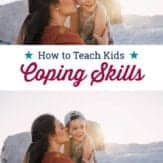
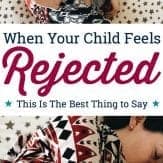
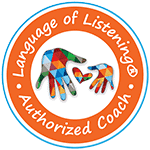
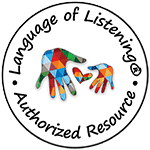
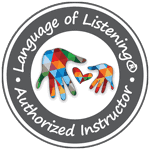
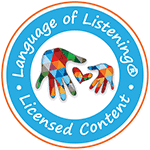




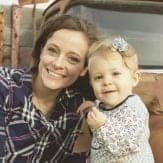



Depends on how your kid is wired. I do not think you are a therapist. Do you know the reason they rejected him? Kids these days have a lot more going on than we now. Situations that we never experienced. I would have asked some questions. My daughter was upset one time-she was being bullied and became very depressed. When she finally broke down like your son, we were able to find out what was really going on-a boy at school sexually harassing her. Feeling their feelings sounds zen and all, but it could be more serious, and it is important to know the whole picture.
Cam, the listening and validation piece that is written about in this post is a great starting point for parents and their kids. However, it is not the end point. You’re absolutely right that understanding the whole picture from the child’s perspective is extremely important. You’re correct in that I am not a therapist. I am a Language of Listening® parent coach.
This beginning step helps to creates a safe space for kids to feel accepted and able to share their experience without judgement or pressing questions which can quickly close children off. From there you can start problem-solving together, digging deeper and working to discover the root cause (as there are often others).
Talk soon,
Lauren